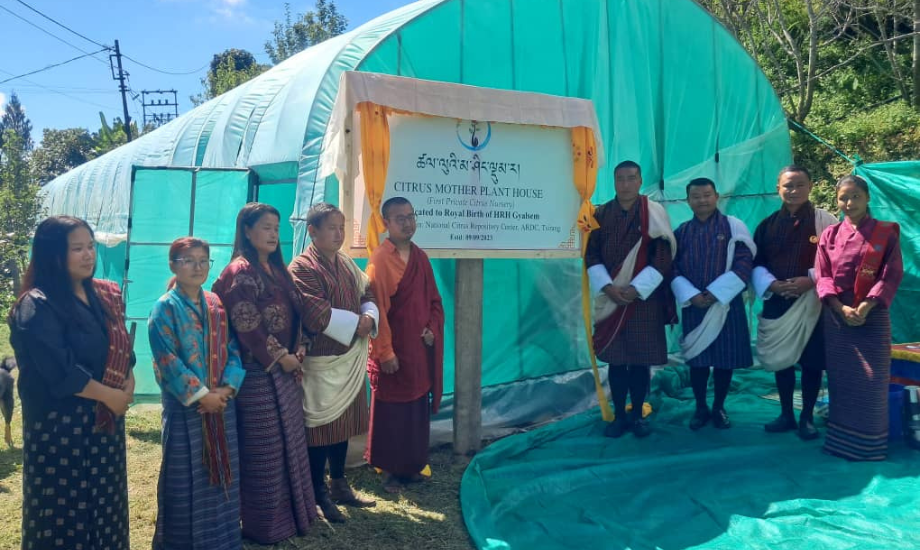For Reviving Bhutan's Citrus Industry
In a significant development for Bhutan’s agricultural landscape, the country’s first private citrus nursery seedling was established in Nobgang Village, Talo Gewog, Punakha on September 9, 2023, coinciding with the birth anniversary of Gyalsem.
This pioneering initiative was spearheaded by Rinchen Pelzang, a technical advisor and the founder of the Druk Shingthog Gongphel Nursery, also known as Bhutan Seedlings.
Rinchen Pelzang’s motivation behind establishing the citrus mother plant house was multifaceted. He aimed to assist the government in marketing citrus products both domestically and internationally, revitalize the declining citrus industry, and contribute to bolstering the country’s economy, among other goals.
While there is a state-owned citrus nursery in Trashiyangtse, it struggles to meet the high demand for seedlings within the country, managing to supply only approximately 5% of the needed seedlings.
Undeterred by this challenge, Rinchen Pelzang, as a private individual, undertook the initiative, investing Nu 0.5 million to establish the citrus mother plant house while adhering to the government’s standard operating procedures (SOP).
His confidence in the endeavor stemmed from his nursery firm’s technical capacity, favorable altitude, and adherence to SOPs. Moreover, the mother plant was sourced from the government’s authorized national repository center in Tsirang, providing further assurance of the nursery firm’s legitimacy.
The government actively encourages private firms to participate in this endeavor, provided they meet certain criteria, including technical feasibility, latitude suitability, experience, and production capacity. Rinchen Pelzang’s nursery fulfilled these criteria and government-set SOPs, making it the first private citrus nursery firm in Bhutan to gain approval from government authorities, experts, and researchers.
The infrastructure of the citrus mother plant house reflects its dedication to maintaining the quality of seedlings. Plants are cultivated in syntex drums with cemented floors to prevent contamination.
Currently, the founder has established the mother block, and production will commence shortly. The nursery aims to supply 10,000 seedlings annually.
Rinchen Pelzang’s vision extends beyond seedling production. He is determined to help revive Bhutan’s citrus industry, which has been grappling with declining production for over a decade.
Citrus greening disease, akin to cancer for citrus crops, has posed a formidable challenge. Chemicals and pesticides have proven ineffective in combating this disease, emphasizing the critical importance of disease control at the seedling stage.
Rinchen shared that he is confident to fulfilling his target of producing 10,000 citrus seedlings annually and hopes to help in supplying the citrus seedlings since over more than a decade, the citrus seedling in the country had been struggling and the production of the citrus has been declining over the years.
The approved citrus varieties for commercial production in Rinchen Pelzang’s nursery include cara cara, local T-13, Wengkhar tsalu ngram (tarku), and bears lime, among others.
Additionally, varieties such as ataures, okitsu wase, halim, dekopon, and more serve germplasm purposes, undergoing adaptability research before being considered for commercial production and supply.
For more than a decade, Bhutan has grappled with citrus diseases, with growers in 16 districts, primarily in the subtropical southern regions, struggling to maintain their citrus trees.
Rinchen Pelzang’s private initiative offers a ray of hope for the revitalization of Bhutan’s citrus industry, ensuring a future where citrus greening is a problem.
Reported by Sherab Dorji from Thimphu

